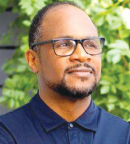Let’s face it, men don’t go to the doctor as often as we should. At least that has been my experience. I felt compelled to finally make an appointment with my primary care physician after I began working as a research assistant at the Smidt Heart Institute at Cedars-Sinai in 2014, as it felt hypocritical to encourage other people to take care of their health while neglecting mine.

Bin McLaurin
A physical examination found that my prostate was enlarged, but that didn’t immediately raise any alarms. I was just 46 at the time, and cancer wasn’t on my radar. No one in my immediate family or inner circle had been diagnosed with cancer, so it wasn’t a disease I had ever thought much about. I wasn’t even that concerned when a prostate-specific antigen (PSA) test showed that my PSA level was high, 14 ng/mL, and my physician recommended I make an appointment with a urologist for a prostate biopsy.
It wasn’t until I was awakened early one morning by a phone call from my urologist who informed me matter of factly that I had prostate cancer that I started to panic. His tone was so nonchalant it took me a few seconds to comprehend what he was saying. He then ticked off a list of things I had to do. First and foremost, he said, find a surgical oncologist and make an appointment to have the cancer removed.
Coming to Terms With Cancer
Although I’m sure the urologist has made hundreds of these calls over his career, unless he has walked in a patient’s shoes, I don’t think he could fathom what it is like to hear this news. The diagnosis left me reeling, and I wondered how long I had to live. I felt completely helpless. After pulling myself together, I called the surgical oncologist the urologist had recommended and made an appointment. During our meeting, he described how he would perform the surgery and explained the side effects I would likely experience, including temporary incontinence and erectile dysfunction. I was so anxious and stressed, I honestly couldn’t comprehend all that he said.
After doing some online research about prostate cancer, including how outcomes are worse for African American men, I scheduled the earliest surgical date I could get.
Coping With Treatment Side Effects
Despite the warnings about the potential side effects from surgery, I was totally unprepared for its aftermath. I awoke after the operation with a urinary catheter, which remained inserted for 2 weeks. Continued urinary issues after the catheter was removed caused me to wear incontinence underwear, which was humiliating. But the worst was to come.
My oncologist said that the cancer, although early stage, was aggressive, and he recommended 37 rounds of adjuvant radiation therapy and injections of leuprolide acetate hormone therapy to reduce my levels of testosterone and decrease my risk of recurrence.
The radiation therapy left me so fatigued that I was unable to work for a year. The hormone therapy made me so emotional, touching television commercials brought me to tears. The treatment also caused frequent hot flashes, weight gain, and loss of muscle mass. I even started losing my hair, although I’m not sure why. The bottom line is, I was a mess and sure I was “circling the drain.”
Finding Relief
Realizing I needed help, I sought the services of a social worker in the oncology department of my hospital. Within the first session with her, it felt like a giant weight had been lifted. She listened to me and validated my feelings in a way my oncologist had not. She suggested online support groups I might find helpful and recommended I join the hospital’s art therapy program for cancer survivors.
At first, I was skeptical because the program included all women, mostly breast cancer survivors, and I wasn’t sure how I would fit in, but I was so desperate to get better, emotionally and physically, I decided to take the chance. I had no idea how drastically the program would change my life.
Living My Best Life
The women taught me how to open up and share my feelings, and the experience was exhilarating and freeing. I next joined a cancer support group traveling to India and there learned lessons of gratitude and the importance of giving back. When I returned home, I launched Men Actively Creating Healthy Outcomes (MACHO; www.macho4life.com), an online resource to raise awareness about cancer risk and improve men’s overall health. I also visit churches and health fairs and speak to African American men about the cancers that are especially devastating for them, including prostate, colorectal, and lung cancers. I also urge them to undergo cancer screenings. Additionally, I started a cancer support breakfast for men to help connect survivors and provide a safe place where they can share their feelings and find fellowship.
My newfound advocacy led me to my current position as Coordinator of Cancer Survivorship Programs at the Samuel Oschin Comprehensive Cancer Institute at Cedars-Sinai Medical Center in Los Angeles. Over the past 5 years, I’ve met the most wonderful, courageous, and generous people in the world. They have changed my life, and I hope I am making a difference in their lives as well.
This past April, I celebrated a year of being cancer-free, and I’m living my best life. I’m grateful for the wonderful care and support I received throughout my cancer journey, which has led me to a new life purpose. But more than that, I’m grateful I now get to help other survivors rebuild their lives and find their new life purpose. Life doesn’t get any better than this. ■
Mr. McLaurin is Coordinator of Cancer Survivorship Programs at the Samuel Oschin Comprehensive Cancer Institute at Cedars-Sinai Medical Center in Los Angeles.
Editor’s Note: Columns in the Patient’s Corner are based solely on information The ASCO Post received from patients and should be considered anecdotal.

